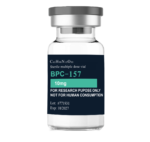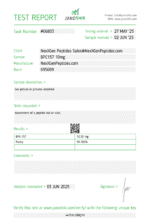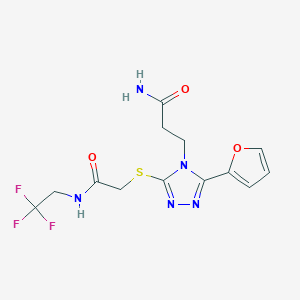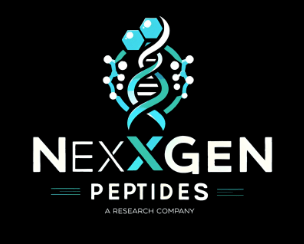



BPC-157 10MG (Research Purposes Only)
$60.00 Original price was: $60.00.$57.00Current price is: $57.00.
BPC-157 5mg – Research Peptide
Molecular Formula: C₆₂H₉₈N₁₆O₂₂
Molecular Weight: 1419.54 g/mol
CAS Number: 137525-51-0
Synonyms: Body Protection Compound-157, BPC 157
Purity: ≥99% (HPLC)
Appearance: Lyophilized powder
Description:
BPC-157 is a synthetic pentadecapeptide that has been examined strictly in laboratory settings for its role in peptide interactions and cellular response mechanisms. It is a research-grade compound that has been analyzed in in vitro models to explore its biochemical properties and molecular activity.
This peptide is not approved for human or veterinary use and has not been evaluated for safety or efficacy in humans. Any reference to studies involving biological interactions pertains exclusively to controlled laboratory research.
Intended Research Applications:
- Peptide-Protein Interactions: Investigated within in vitro laboratory models for its biochemical role.
- Cellular Studies: Examined under controlled experimental conditions to assess peptide dynamics.
- Regulatory Pathway Research: Studied for molecular activity in research environments.
Storage Conditions:
- Store in a cool, dry place, away from direct light and moisture.
- Recommended storage: -20°C for long-term stability.
- After reconstitution, store at 2-8°C and use within a limited timeframe.
⚠ FDA DISCLAIMER – FOR RESEARCH USE ONLY
This product is strictly for laboratory research purposes and is not approved for human or veterinary use. It has not been evaluated by the U.S. Food and Drug Administration (FDA) for medical, therapeutic, diagnostic, or dietary purposes.
By purchasing this product, you acknowledge and agree that:
- It is not intended for human consumption or administration in any form.
- It will only be used in compliance with all applicable laws and regulations.
- It is for in vitro research and laboratory experimentation by qualified professionals only.
WARNING: The use of this product in humans is strictly prohibited. Misuse may violate federal, state, or local laws. NexXGEN Peptides LLC assumes no liability for improper handling, use, or distribution.
For further details, please review our Terms of Service
In stock
Description
BPC-157 10mg – Research Peptide
Molecular Formula: C₆₂H₉₈N₁₆O₂₂
Molecular Weight: 1419.54 g/mol
CAS Number: 137525-51-0
Synonyms: Body Protection Compound-157, BPC 157
Purity: ≥99% (HPLC)
Appearance: Lyophilized powder
Description:
BPC-157 is a synthetic pentadecapeptide that has been examined strictly in laboratory settings for its role in peptide interactions and cellular response mechanisms. It is a research-grade compound that has been analyzed in in vitro models to explore its biochemical properties and molecular activity.
This peptide is not approved for human or veterinary use and has not been evaluated for safety or efficacy in humans. Any reference to studies involving biological interactions pertains exclusively to controlled laboratory research.
Storage Conditions:
- Store in a cool, dry place, away from direct light and moisture.
- Recommended storage: -20°C for long-term stability.
- After reconstitution, store at 2-8°C and use within a limited timeframe.
⚠ FDA DISCLAIMER – FOR RESEARCH USE ONLY
This product is strictly for laboratory research purposes and is not approved for human or veterinary use. It has not been evaluated by the U.S. Food and Drug Administration (FDA) for medical, therapeutic, diagnostic, or dietary purposes.
By purchasing this product, you acknowledge and agree that:
- It is not intended for human consumption or administration in any form.
- It will only be used in compliance with all applicable laws and regulations.
- It is for in vitro research and laboratory experimentation by qualified professionals only.
WARNING: The use of this product in humans is strictly prohibited. Misuse may violate federal, state, or local laws. NexXGEN Peptides LLC assumes no liability for improper handling, use, or distribution.
For further details, please review our Terms of Service
Additional information
| Weight | 1 oz |
|---|
Related products
Cagrilintide 10mg (Lypholized Powder) Research Only – Nexxgen Peptides
Cagrilintide 10mg (Mixing Solution Sold Separately)
Cagrilintide Peptide Summary
Product Specifications: 10mg Lyophilized Powder (>99% purity) in 3ml vial. *Requires Reconstitution with solvent such as bacteriostatic water (Sold Here)* Appearance: Solid, white powder in 3mL glass ampule Chemical Formula: C194H312N54O59S2 PubChem CID: 171397054 Molecular Weight: 5999.72 g/mol Synonyms: Cagrilintide Storage: Store at ≤25°C, sealed, away from heat, light, and moisture. Concentration: ≥99% Disclaimer: This product is intended solely for laboratory research purposes. It is not suitable for consumption by humans, nor for medical, veterinary, or household purposes. Researchers should handle Cagrilintide with care and adhere to strict safety guidelines during experiments. Kindly review our Terms & Conditions before making a purchase. *Cagrilintide Structure
 Source: PubChem
Source: PubChem Kisspeptin 10mg Lypholized Powder (Research Purpose Only)
Kisspeptin-10 Peptide Summary
Product Specifications: 10mg Lyophilized Powder (>98% purity) in 3ml vial. *Requires Reconstitution with solvent such as bacteriostatic water (Sold Here)* Application: Research neuropeptide evaluated in gonadotropin-releasing hormone studies Appearance: Solid, white powder in 3mL glass ampule Chemical Formula: C63H83N17O14 PubChem CID: 25240297 CAS Number: 374675-21-5 Molecular Weight: 5857 g/mol Synonyms: Metastin 45-54, KiSS-10 Storage: Store at ≤25°C, sealed, away from heat, light, and moisture. Concentration: ≥98% Disclaimer: This product is intended solely for laboratory research purposes. It is not suitable for consumption by humans, nor for medical, veterinary, or household purposes. Researchers should handle Kisspeptin-10 with care and adhere to strict safety guidelines during experiments. Kindly review our Terms & Conditions before making a purchase. *Kisspeptin-10 Structure
 Source: PubChem
Source: PubChem 











